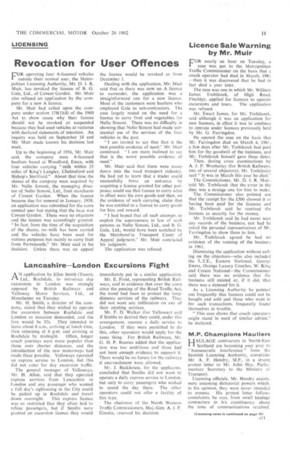Lancashire—London Excursions Fight
Page 13

If you've noticed an error in this article please click here to report it so we can fix it.
AN application by Ellen Smith (Tours), Ltd., Rochdale, to introduce day excursions to London was strongly opposed by British Railways and Yelloway Motor Services, 1.td., at Manchester on Tuesday. Mr. H. Smith, a director of the company, stated that they wished to operate the excursion between Rochdale and London as occasion demanded, and the fare would be 32s. They intended to leave about 6 a.m., arriving at lunch time, then returning at 6 p.m. and arriving at Rochdale by midnight. Often, longer coach journeys were more popular than those over shorter distances, and the introduction of the new motorways had made these possible. Yelloways operated an express service to London, but this did not cater for day excursion traffic. The general manager of Yelloways, Mr. H. Allen, said that they operated express services from Lancashire to London and any passenger who wanted a full day's sightseeing in the City could be picked up in Rochdale and travel down overnight. This express licence was so restricted that they often had to refuse passengers, but if Smiths were granted an excursion licence they would
immediately put in a similar application.
Mr. E. Frost, representing British Railways, said in evidence that over the years since the passing of the Road Traffic Act, the trend had been to protect the longdistance services of the railways. They did not want any infiltration on any of their existing services. Mr. F. D. Walker (for Yelloway) said if Smiths So desired they could, under this arrangement, operate a daily service to London. If they were permitted to do this, other operators would apply for the same thing. For British Railways, Mr. G. H. P. Beames added that the application was too ambitious and there had not been enough evidence to support it. There would be no future for the railways if encroachment were allowed.
Mr. J. Backhouse, for the applicants, concluded that Smiths did not want to operate a daily express service to London, but only to carry passengers who wished to spend the day there. The other operators could not offer a facility of this type.
The chairman of the North Western Traffic Commissioners, Maj.-Gen. A. 3. F. Elmslie, reserved his decision.




































































































